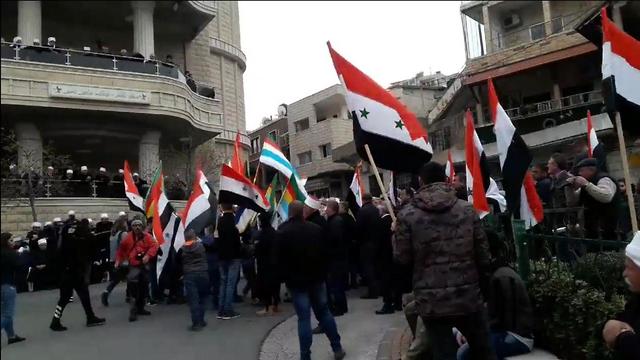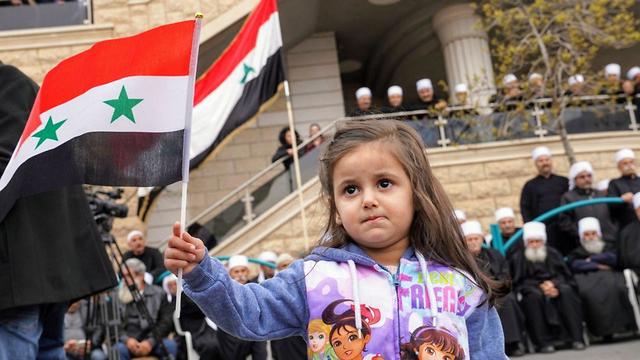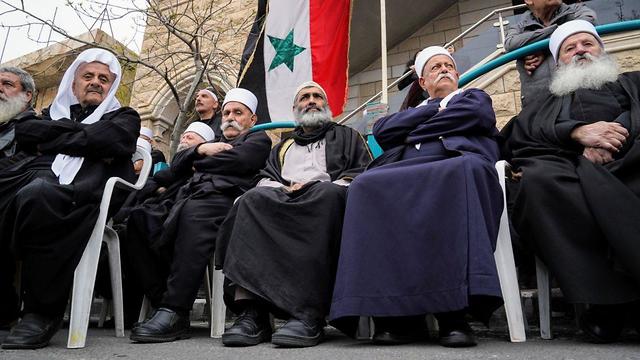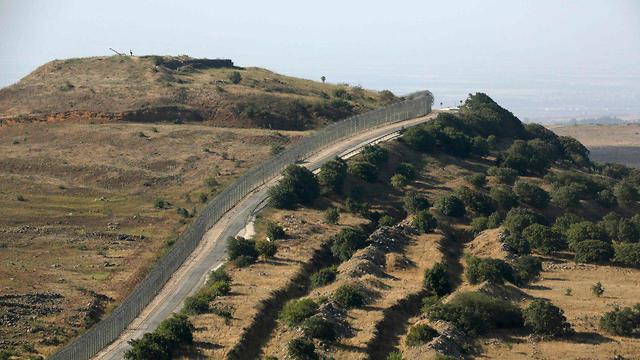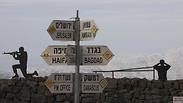
Golan Druze reject Trump backing of Israeli sovereignty
Residents of 4 Druze towns protested President Trump’s announcement, insisting that the Golan Heights belong to Syria; Israelis see move as just stating the obvious as area too strategic to relinquish.
The declaration by US President Donald Trump recognizing Israeli sovereignty over the Golan Heights is causing a lot of excitement in Israel. But many of the Druze residents of the plateau reject the announcement and insist that they are Syrians, loyal to the Assad regime.
The fertile hillsides of the Golan Heights are scattered with villages inhabited by 22,000 Druze, an Arabic speaking minority who practice an offshoot of Islam. Many still have relatives on the Syrian side of the fortified boundary.
That annexation was not recognized internationally, and although they have lived under Israeli rule for more than half a century and shop fronts bear signs in both Arabic and Hebrew, many Golan Druze still regard themselves as Syrian (unlike other Druze citizens of Israel who serve in ht IDF and view themselves as Israeli).
"Trump can make his statements and say he wants to make the Golan part of Israel. But we know this will stay Syrian land," said Sheikh Mahmoud Nazeeh, 70.
Amal Safadi, 54, a librarian, said: "Our blood is Syrian. If you take a blood test for a child, it will read Syrian."
Druze residents of the Golan have the option of obtaining Israeli citizenship, but many reject it for political reasons.
In October last year hundreds demonstrated against the holding of Israeli municipal elections on the Golan, blockading the polling station in Majdal Shams and waving Syrian and Druze flags.
Madjal Shams overlooks the divide between the Israeli section of the Golan and the part of the plateau controlled by forces loyal to Syrian President Bashar al-Assad.
The two armies are divided by an Area of Separation — often called a demilitarized zone — into which their military forces are not permitted under a 1974 ceasefire arrangement.
Israeli reaction
Trump's Golan announcement on Thursday came with many Israelis celebrating the Jewish holiday of Purim, which by tradition commemorates the survival of Jews who had been marked for death while living under Persian rule in antiquity.
Israel regards the Golan as a strategic asset, because its hills overlook northern Israeli towns, particularly near its inland Sea of Galilee. Around 20,000 Jewish Israelis live in the Golan itself, many working in farming, leisure and tourism.
Many Israeli commentators saw Trump's declaration as a timely boost for Israeli Prime Minister Benjamin Netanyahu ahead of Israeli elections scheduled for April 9, in which he has been dogged by corruption allegations.
But some Israelis living in and around the Golan said Trump's gesture would change little on the ground.
The U.S recognition of Israeli sovereignty in the Golan makes us happy, however our daily routine does not involve dealing with whether Israeli sovereignty is being recognized or not," said Haim Rokah, head of the regional Israeli council in the Golan.
Rami Yogev, 65, a resident of Dan kibbutz, which is overlooked by the Golan, said he remembers shelling from the then Syrian-held heights onto his town during the 1967 war.
"I don’t think Trump’s announcement will make any difference here. It’s not going to change anything. The residents in the Golan already feel like they’re Israelis. They have a better life than being in Syria or any Arab country - just look what happened in the war in Syria," he said.
Israeli newspaper front pages on Friday were dominated by the news from Washington. But some commentators injected a note of caution.
"Some will say that this is 'Trump’s election gift to Netanyahu.' Some will say that these are 'two people in legal troubles who are convinced that there is a global conspiracy to topple them,'" wrote Alon Pinkas in Yedioth Ahronoth.
But he also pointed out that Israelis younger than 52 had never known any other reality regarding the Golan. "This is good, it is nice, it is a recognition of reality, it is almost self-evident. The question is: Does it really mean anything?"
Palestinian officials and analysts predicted that Trump's intervention on the Golan would further jeopardize prospects for the White House's long-awaited peace plan for the Middle East, spearheaded by Trump's son-in-law, Jared Kushner.
Palestinians were already angry at Trump after his recent decisions to recognize Jerusalem as the capital of Israel, and to move the U.S. Embassy to the city.
Nabil Abu Rudeineh, a spokesman for President Mahmoud Abbas, told Reuters: These promises will not give legitimacy to the “Israeli occupation and the Golan will remain Arab and Syrian land.”
In Gaza, political analyst Adnan Abu Amer said Trump was trying to reshape the region ahead of the plan. "It is clear that Trump is trying to pre-empt the official announcement of the deal by imposing some facts on ground," he said.










